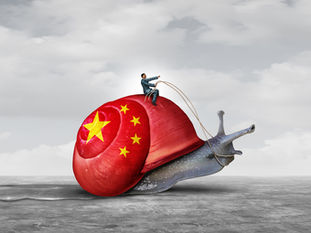
Just before China celebrated the 75th anniversary of the founding of the People’s Republic of China on October 1st, a series of policy measures were announced to stimulate the economy and deal with the societal issues of declining demography, raising youth unemployment and urbanization inequality. The result was a bullish stock market that surged to their best week since the global crisis of 2008 when Beijing went all in to save the domestic economys.

As the long awaited strong fiscal and monetary policies came just after dissapointing economic data of August in China, most international commentators read Beijing’s actions as a sudden panic move to save an economy in serious trouble. Very few see it as a sustainable solution for boosting the economy beyond 2024. Beijing is seen more like a bull in China shop similar to how the CPC exited from covid - unplanned. The logic goes that the economy in China is so bad that Beijing has now to “inflate” the sentiment with new stimuli. I have a different opinion.
The bull that Beijing unleashed in its China shop is far from reckless. I would say that Beijing has been rather taking the real bull (real-estate and local government debt) by the horns, and not merely by waving a red rag. The Chinese government has been very busy taking air out of these bubbles, to seek a soft landing for the economy to take off again. Most Western economists however were urging Beijing to stimulate the economy much earlier. But do you really want to feed an angry bull? In my view swift stimuli after the pandemic and during an economic challenging period would have resulted in the Chinese people to save even more, not consume more to bring back the economy. Chinese developers and local governments would not have paid off their debts or bad loans, and instead spend or even waste more. Today the bulls of the economy are exhausted, and therefore, it is the right momemt to slowly feed the animal again so it doesn’t starve. And yes, the animal spirits came quickly back!
How did Beijing feed the beast? The People’s Bank of China has reduced the reserve requirement ration (RRR) for banks by 0,5 percentagepoints, injecting 142 billion USD into financial markets to increase liquidity and more is to be expected this year still. They also lowered the seven-day reverse repo rate by 20 basis points and the interest rate on medium-term lending by 30 basis points to reduce borrowing costs. To save the property sector from drowning, they cut mortgage rates for existing loans by 0,5% and reduced the minimum downpayment for second homes from 25% to 15%. They also introduced a re-lending facility to provide funding for affordable housing. Regarding capital markets, which fueled a bull market last week, swap and re-lending facilities were established to increase the liquidity for financial institutions, allowing companies to obtain funding through asset collateralization and share buy-backs.
On societal side, major steps have been taken to promote high-quality employment, with higher wages and better social insurance coverage to protect workers. The main decision was for China to gradually raise the pension age over the next 15 years:Men: The retirement age will increase from 60 to 63. Women in Managerial Positions: The retirement age will increase from 55 to 58.Women in Non-Managerial Roles: The retirement age will increase from 50 to 55. Starting in 2030, the minimum years of basic pension contributions required to receive a pension will gradually be raised from 15 to 20 years. This should push the demographic wall a decade away to 2050 to support the 400 million pension aged people previously expected by 2040.
When I was in Shenzhen last month, I learned something we all prefer to stay silent about: AI is creating a lot of urban unemployment. The cat is already out the bag in China. When the media reports on China’s urban youth unemployment, they blame it mostly on a bad economy. But the industry that traditionally hires young educted graduates in China is the tech industry – and they are still mostly growing today. Why aren’t they hiring? The story goes that everyone is waiting for the economy to get its confidence back. The reality on the ground is that Chinese tech companies are doing a hire freeze because they appreciate that artificial intelligence is taking over many tech jobs. They prefer not to hire inexperienced people as firing them is costly, and prefer now to invest in AI than in people. The biggest job market ‘unkonwn’ in China is not when the economy will be back, but how performant AI will become to replace employees. In Europe and America we are still mostly living in AI denial which will hit us even harder than China as our service industries are a larger part of the economy.
In every keynote I give, I say that China is cyclical. There are periods of lots of control and moments Beijing lets go of control – the grey zone. For three pandemic years, we have seen one controlling measure after the other. This was intentionally to get back to a sustainable growth model. Now we are entering an upward cycle of less control and new opportunities. A little late, maybe? Hard to tell. But seeing from the reaction of global investors who are buying up all Chinese bonds they can get their hands on, and inflating the stock market – I believe the confindence in the Chinese market will return as fast as it left. Of course, scars will remain – and consumers and entrepreneurs will remain cautious for quite a while, some even have left the country and will not return. But anyone who lived in China knows the nation’s infrastructure, speed and resilience of Chinese people is second to none.
I trust the Chinese bulls have awoken again, and although tired, will soon show again what China is made of. The world will continue to be bull-headed or even try to shoot the bull, but Chinese bulls are symbols of strengths, hard work, patience and resilience.






